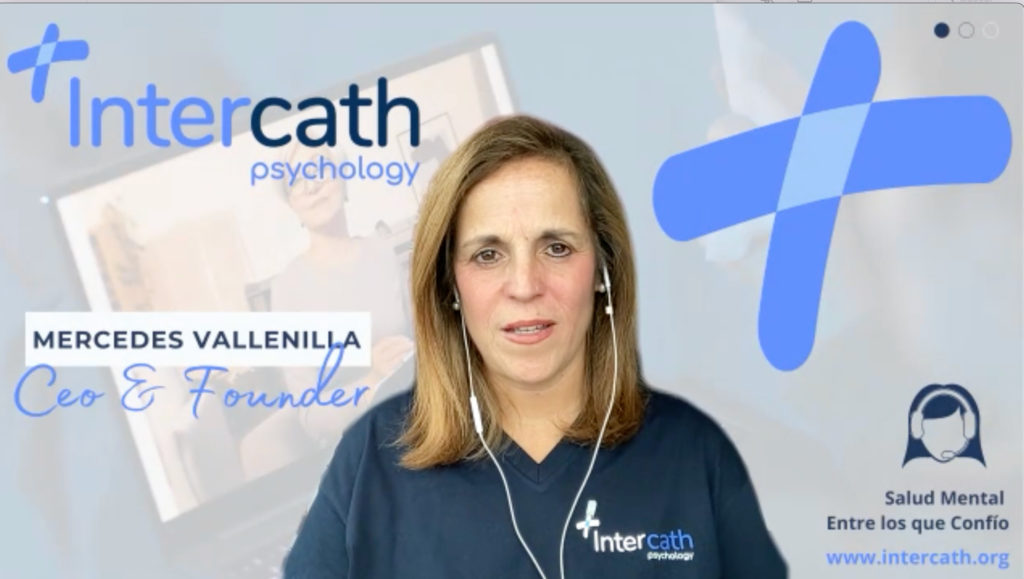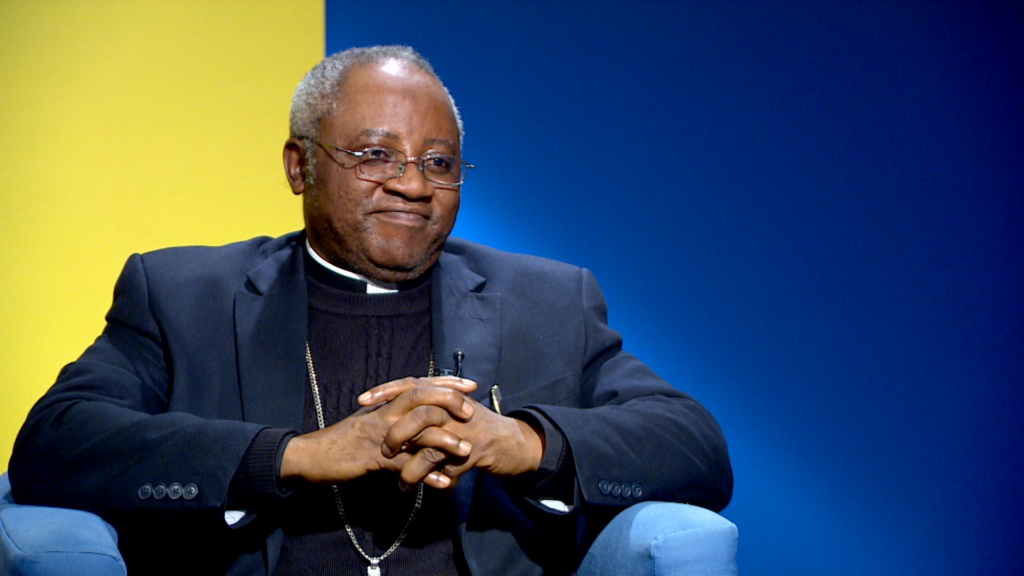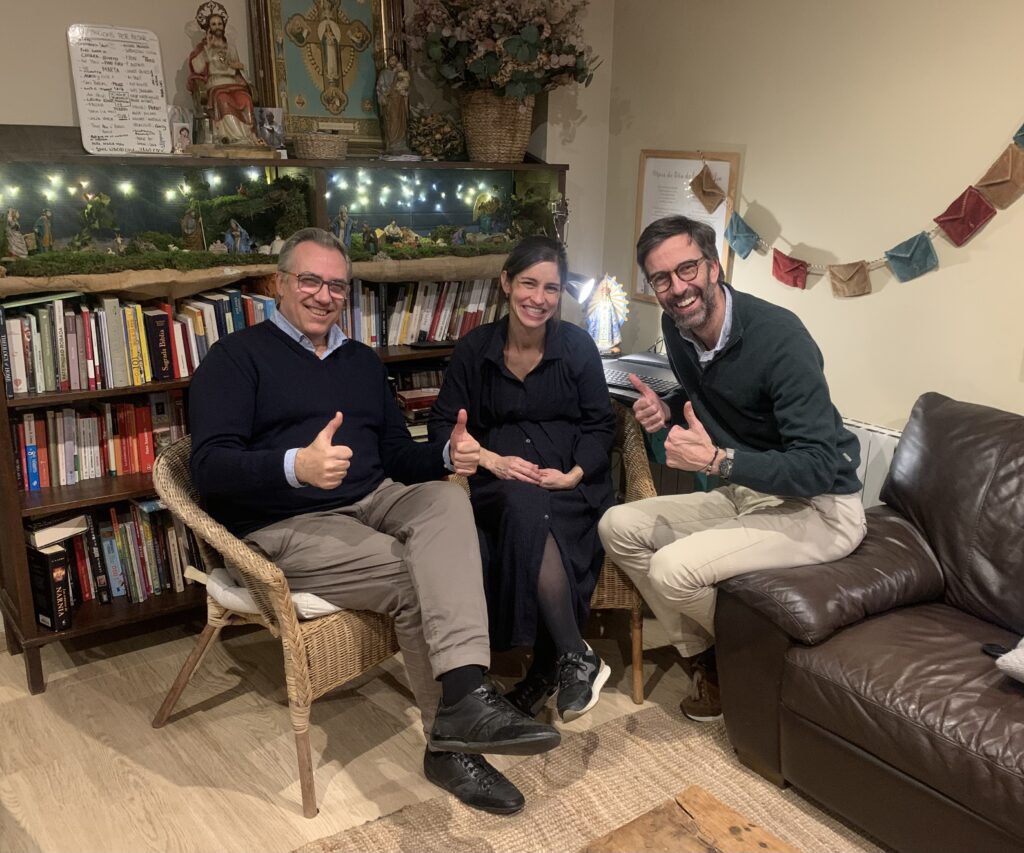Interview with Mercedes Vallenilla, Intercath Psychology Founder
Virtual Network of Psycho-Spiritual Accompaniment

Mercedes Vallenilla, psychologist, lecturer, blogger, author of four books on Psychology and Christian Spirituality, and Ph.D. candidate, has worked for over 30 years in social and apostolic works at the service of the Catholic Church. She is the Founder of Integral Catholic Psychology, which began in 2012 as a blog and today is a Virtual Center of Accompaniment. From her office, she attends to patients from different parts of the world. Born in Caracas, Venezuela, she is a naturalized Mexican citizen and lives at present in Cancún, Mexico.
She has inspired her work as a mission and vocation. Thanks to the Virtual Center of Accompaniment this service has grown to become an Organization of Psycho-Spiritual Accompaniment called Intercath Psychology, addressed to all Catholics worldwide. From here she offers a proposal of psychological care and spiritual accompaniment that, cementing its base on the dignity and integral conception of the human person, helps people to “heal affective wounds.”
In this interview, Mercedes Vallenilla talks about her experience as a virtual psychologist, she explains psycho-spiritual accompaniment through a doctor’s office, the relationship between Psychology and the Christian Faith, and the importance of healing internal wounds to be able to live the Christian life fully.
We are talking about the Intercath Psychology Organization over which you preside. What is it about and how useful is it?
Intercath Psychology is a virtual community of Catholics, a network of psychologists, and of psycho-spiritual accompaniment.
 It is accompaniment in a virtual way through a digital platform of services: what is seen is a Web page, but it’s supported by two platforms, which have been developed with important technological investment and automated management processes: organization of agenda, of psychologists, payments, follow-up of patients. In the middle of these two platforms is the landing page of recruitment and selection.
It is accompaniment in a virtual way through a digital platform of services: what is seen is a Web page, but it’s supported by two platforms, which have been developed with important technological investment and automated management processes: organization of agenda, of psychologists, payments, follow-up of patients. In the middle of these two platforms is the landing page of recruitment and selection.
The service is addressed to Catholics worldwide. The brand is designed by young people, I’m surrounded by them. 70% of my patients are millennials and I’m delighted because we can carry out a wholly important preventive work. We are open to receiving people that ask for it and we are going to help them, given that this is the consistent attitude of our faith. However, whoever comes to us must know that we will be faithful to our system of Christian beliefs.
What has been the response to this project?
This project is not an idea that arose in one day. It is a spiritual inspiration. My personal path and trajectory have led to this. Ten years ago I created Integral Catholic Psychology, amid incomprehension, discrimination, and insults; it seems unbelievable but the most outspoken critics are members of our own Church. The response, today, has been wonderful. The result, a week after the launching of Intercath Psychology, is the one I thought of in two months of its existence.
A considerable number of psychologists took part in the selection process, among whom we were able to choose the first group, with the best professional profiles and with ecclesial experience. They come from 22 countries around the world. At the end of a few months, we had to pause the convocation given demand for applications. The selection system is carried out on the inercath.org page, in the Section dedicated to psychologists. It’s also possible to consult there, the requirements that give evidence of need, on the part of the candidate, of a profound theoretical and practical formation in the Christian faith. For example, there is a requirement that jumps out of the page, and it’s the request for a letter of reference because we are interested in this opinion.
What does psychology have to do with the Christian life?
Psychology has everything to do with the Christian life. I have been working for 30 years as a psychologist in this context because this is my vocation if I am to be Christian. During this time I have cared for people that live a spiritual life. I have advised members of Religious Institutes. An error that we believe is committed very often in face of human situations, is to jump immediately to the spiritual, “spiritualizing” the situation.
When the wounds that fragment us have been treated previously, and we jump to the spiritual dimension, we fracture human anthropology, namely, we break the unity of body, mind, and soul. We often forget that the function of the faith isn’t to resolve human problems but rather to nourish our relationship with God and to help us to accept the truths He has revealed to resolve the existential problems, which have a radical and profound solution from a relationship with God.
Psychology has to do with the Christian life because we must first be men if we are going to be able to aspire to be saints. This work is done in unison, hence we have to learn to manage our anthropological base: to learn to connect with our being men and to manage our corporal, affective and cognitive needs.
There is a key element in Christian Doctrine, which is very important to consider and it is that humanity is marked by original sin so that there are very concrete and dramatic consequences for the life of people at the level of their emotions. But we also know that we can receive God’s grace which has an elevating effect and heals our emotional imbalances.
Psychology is oriented to managing this human dimension so that this base will enable the spiritual to integrate everything. Psychology, stemming from integral humanism, enables us to come to that encounter with ourselves based on a correct vision of man as a psycho-spiritual unit. The capacity to reason leads us, when we are healed, to the most important truth of all: we are loved by God and we are called to live here in true and profound love.
Should the Church invest more energy in this field?
Absolutely. Pope Francis has already made the Exhortation in the conclusive Document of the Synod of Bishops of 2018. In the month of November 2021, the Pope’s video talks about this situation and he invites to pray for people that suffer depression. The Pope asks that psychological elements be included, especially when they lead man to transcendence. Because when the merciful gaze is not unlinked in the therapeutic process, psychology is a great power. We lay professionals in this field can, as we are doing so, give exponential answers to this real problem of today’s Christians. Universal pastoral care has tried to attend to it.
Why do we need to heal internal wounds? How can the balance be achieved to be well and to live the Christian life in fulness? What is your experience?
Being a missionary in the Philippines – with Cardinal James Sin – I was diagnosed with a very rare disease, called the Sheehan Syndrome. At that moment I was told I had ten years to live. I entered a great crisis and, when I exhausted my spiritual resources trying to find an explanation for the situation, I was broken. I experienced that anxiety, which is very frequent among my patients. How can my faith help me to resolve a problem?
The term ”emotional wounds” is a term we use in the context of the Church, not in science. We can explain the origin of wounds from two scientific perspectives. The first from the stress-diathesis model and the second from the biopsychosocial model. The first appears before an event, as, in my case, when from a situation of fulness one passes to a profound fall full of pain. The second cause comes from factors of a biological, psychological, or social type. It can express itself in the form of symptoms that cause internal dysfunctional disorganization in the person, impeding his happiness and fulness of life. When time goes by and their wounds are not attended, what science calls disorders can be created. The mind becomes sick causing great pain and disintegration of the personality. When a person is fragmented, he cannot be happy.
And the fact is that we are called to be happy including here on earth. For us, Christians, the certainty that Jesus resurrected, including with his healed physical wounds, is altogether a message of hope that tells us to resurrect and heal our own wounds already here on this earth. This is the message I seek to transmit with my collaborators through the service in Intercath Psychology.
The most common wounds — said in colloquial language –, that my patients have are related to abandonment and rejection. The cause of this is the absence of excessive parental control and/or a presence that doesn’t generate bonds. Today’s young people are growing up with an affective wound, an emotional immaturity that leads to taking refuge in places where happiness doesn’t exist, generating serious disorders. We know that the thermometer of human maturity is affectivity.
To go to a psychologist is increasingly less of a taboo especially among young people. However, among Christians, it’s still not very clear when to ask for help from a psychologist and when to ask it from one’s Spiritual Director. . . .
There is much of the Church and of science behind his subject that we won’t address now, suffice it to mention Freud who affirmed “religion is the cause of hysterias and neuroses. It was from here that the historical divorce was created between science and faith. Added to this was the discovery of the scientific method, where inventions began, such as vaccinations that cured illnesses and man began to diminish his indigence, namely, his capacity to solve his problems by severing his dependence or bond with God. We say in regard to this that man has become anthropocentric. There is, hence, a rejection of all that is “old,” obviously opening a divorce between faith and psychological life. Being noted at present is a change of science’s paradigm; the spiritual element is being incorporated into the bio-psycho-social model as man is to the roots which he should never have left; he is beginning to see God again. I will frame my answer in this connection.
Young people want to be spoken to directly. If there is clarity and logic they respond wonderfully, even if the reality is painful. I think that that’s why I’m surrounded by young people, because I don’t sweeten or soften during the therapy of accompaniment, but is commonly called, “sweetening the pill.”
When should one go to a psychologist? When you are semi-conscious that you have symptoms that make you feel bad and don’t enable you to be happy. When you can’t control your impulses, when you know you’re not acting as you would like to when you are emotionally disorganized — these are some of the guidelines that are signs that one’s own resources are insufficient.
There are situations, such as, for example, the death of a loved one, when the person has to respond to that painful event and presents emotional maladjustments but which they can overcome in time; here a psychologist isn’t necessary. If after a year and a half of the event the situation isn’t resolved and the person isn’t functional again, then it’s time to seek psychological help. The situation manifests itself usually with the expression “I don’t know what I have.”
What is the model of accompaniment, the psychological and spiritual tools for which you have opted and offer in your virtual doctor’s office?
I regard everything as inspiration of the Holy Spirit, something that was forged in over 30 years of experience of life, prayer, and study. The methodology I use in this model of accompaniment is effective because I’ve tried it for more than 11 years in my office regardless if the problem is existential, sub-clinical, or clinical. I very much respect colleagues that have preceded the effort to unite science and faith, which is psycho-spirituality. At present, the model already has a theoretic consistency, a methodology of approach, and a method with its phases and competencies. I am doing a doctorate to be able to have this whole psycho-spiritual Model inherited by other colleagues through a School of Catholic Psychologists.
However, given that I cannot handle sufficiently the requests for help, I wished to give an answer to the urgent need of believers: an accompaniment, integrating the system of Christian beliefs. Hence I funded Intercath Psychology. The principles that guide our work favor the humanist personalist orientation, where the person is regarded as a substantial unit of mine, body, and soul, made up of four dimensions are the cognitive, emotional, spiritual, and corporal within a family and social environment.
The educational role of the family is acknowledged, recognizing it as the most wonderful plan of God for man, as a place where the human being is formed or deformed, the place where secure attachment is formed and is the basis of society. We adopt the vision of man in transcendence, which leads to the search for truth. We center ourselves on a balanced theology according to the Catechism and the Magisterium of the Catholic Church. We accept our mission as psychologists out of love of God as a Christian vocation of service.
How does one leap from the psychological to the spiritual?
It’s not a leap; it’s a gradual journey. How to undertake it? I think it’s a gift to treat the trouble and to guide the person to the experience of a relationship with God. When one attends to the distortions of the mind, that person begins to feel loved and then recognizes the God of love of his life who never left him but rather sustained him.
You can do it because you have had the experience of God. Do the other psychologists work like this?
Look, I answer you from my experience. When we launched Intercath Psychology and began the recruiting of psychologists, I met with professionals who felt in their heart the same thing as I did during all that time, namely, a great desire to change the world and to take mercy to people’s hearts. It was striking to see how God was working in the hearts of so many professionals around the world who felt alone in their desire to accompany their brothers in the faith but from our system of Christian beliefs and at the same time our greatest treasure, which is the faith.
My desire is to open a School of Psychologists. Hence I’m pursuing a doctorate for others to inherit, moreover, the Model of accompaniment that has been given to me as a gift.
What are the three things you would like your patients to know before beginning a therapy?
The first thing is that it doesn’t matter where he is, or how big or small his problem is. We are going to accompany him. The second thing is the discarding of the learned hopelessness, convinced that no one or anything can change his situation: this isn’t true. The third thing is to remember that resurrection exists and God is able to save everything. That’s why resurrecting Jesus showed us the healed wounds of His body because, among many other things, He wanted to say to us that healing is possible for one who lets himself be helped and who trusts in His power. We, the Catholic psychologists, are the “human face of divine mercy,” through our profession that grace that heals will be transmitted.
Thank you very much, Mercedes, for the mission you bring made with love, professionalism, and service.
Translation by Virginia M. Forrester
Related

Thy will be done
Albert Cortina
17 April, 2025
35 min

Despite hardships, Christianity is growing “astronomically” in northern Nigeria
Ayuda a la Iglesia Necesitada
10 April, 2025
3 min

“Christianity, a Powerful Engine of Social Transformation”
Exaudi Staff
09 April, 2025
3 min

Let God be God
Albert Cortina
11 March, 2025
25 min
 (EN)
(EN)
 (ES)
(ES)
 (IT)
(IT)

